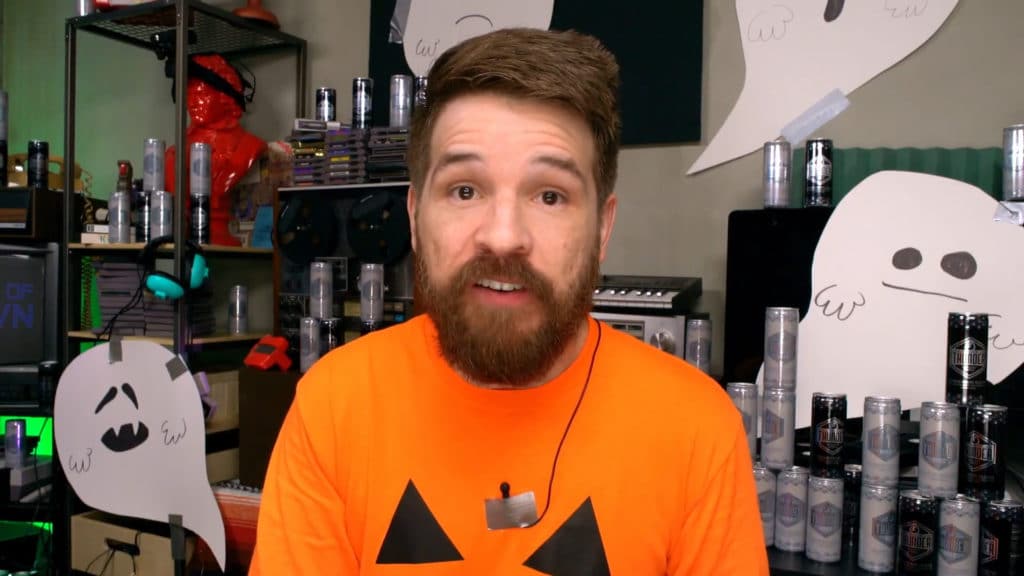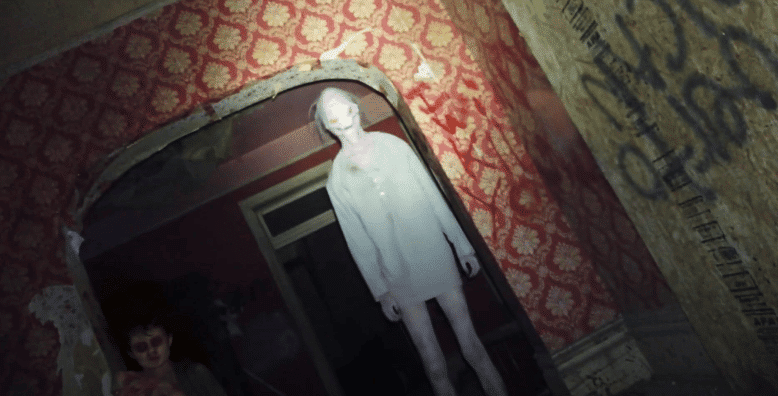
Investigations of haunted houses or places have been a horror staple since the inception of cinema. And, whilst in many cases (with some notable exceptions) the allegedly haunted house/place itself has remained unchanged, the means of investigation themselves have changed and developed as the years have passed. You could even argue that technological developments have revolutionised our ways of seeing altogether. In The Blair Witch Project (1999), a herald of this new kind of experience, ghostly phenomena are refracted through Heather’s video camera, which she is using for the purposes of making a student film; the camera offers some welcome distance, somehow, from the unreal horrors which she witnesses. We see what she sees, as she sees it: we are reliant on her as the intermediary, and we are limited by her experiences. It was a sign of things to come.
Well, step forward Deadstream (2022), which shows us, first and foremost, that things have come a long way since The Blair Witch Project. Deadstream recognises this line of progression, as its protagonist – livestreaming sensation Shawn Ruddy – is shown trying to hawk some merch which references Blair Witch’s own publicity slogan. But now, with smartphones, streaming platforms, editing software, multiple cameras, infrared settings, custom music and of course a live feed, the relationship between filmmaker and audience has been thoroughly revolutionised. This immediacy is very energising, bringing the film bang up to date as well as offering us a lively, multi-layered take on a classic horror movie trope.
Shawn (played by director and co-writer Joseph Winter) is an internet personality who’s been on an involuntary six-month hiatus after an unspecified fall from grace. It must have been bad: he lost all of his monetisation in the process, and so is determined to reclaim it with a comeback special. This entails a special livestream on his platform of choice, LivVid.TV, as he visits a haunted house, location as-yet secret. This place, not-at-all ominously known as Death Manor, comes with a suitably excessive back story: here, at the end of the 19th Century, a woman called Mildred took her own life in mysterious circumstances. Perfect! Shawn heads into the house to explore and monitor any paranormal activity. He vows to investigate any mysterious goings-on he hears, sees, or picks up on his pretty extensive array of kit: this is part of his shtick, something best described as competitive stupidity – which aims to keep his attention-span deprived followers on his stream for as long as possible. It’s his followers who, in-between keeping up an insulting stream of comments or declaring themselves bored, double-dare him to ‘provoke the spirits’.
Of course this all goes to hell in a film which is by turns creepy, grisly and Raimi-nasty, but it’s in how it gets there that Deadstream really shines. It gets the right things right: good location, effective twists, humour which is knowing but not eye-rolling, and a central performance which could conceivably all be part of an act, so used to performing for the camera does Shawn appear to be. Winter really captures something here; even if you don’t personally engage with livestreamers and Influencers yourself, you’re likely by now to have some idea what makes them successful, and high on that list is a kind of jovial artifice, amplified even beyond the artifice we’ve seen on TV for decades because self-made media personalities have to crow that little bit louder to get noticed. Shawn Ruddy is a very plausible figure for our cynical times, ‘working on himself’ but motivated by hard cash, apologising multiple times for his misdeeds but only believably so on a handful of those occasions. It’s very difficult to see a real person underneath that rock-solid veneer – until circumstances prevail, of course. This is like something Goffman could have come up with on the presentation of self, had he lived long enough to see what a good smartphone could do. For all that, Shawn isn’t wholly unlikeable, though. Even at his worst, he probably doesn’t deserve what he gets – he’s an idiot, but an idiot partly formed out of his ongoing interactions with millions of other idiots.
This dialogue with his followers is a genuinely interesting feature of the film, one which places it in the here-and-now and which will one day be as interesting a time capsule as Blair Witch is now, because surely we can’t be far away from a horror film made entirely in the Metaverse. Shawn’s ability to reflect on his film as it’s being made, and on the impact it might be having, is a very new phenomenon in its own right: he keeps in mind that he is crafting a piece of media, and he makes the most of the means at his disposal to make it as good a film as it can be; his preoccupation with different angles, cameras and of course custom soundtracks shows that. The ways in which he fights to keep control of his film reminds us that he is aware, at all times, that his relationship with his followers is an ongoing negotiation, and his struggle is as much to retain creative control as it is the rather more pressing need to stay alive. It’s also worth saying that Deadstream is able to dispense with some of the so-quickly hackneyed issues of the ‘found footage’ subgenre, the main one being ‘who edited this, and when?’ Here, we know. We are also done with grainy, unclear footage: this film is surprisingly bright, colourful and sharp throughout. Oh, to be a ghost hunter in the 2020s…
Whilst some of the in-script revelations towards the end of the film spell things out more than really necessary, on the whole, Deadstream is an engaging, richly-textured and often self-deprecating film which provides a sense of progression in horror, as well as paying tribute to films which have brought us to this point. It’s a lot of fun, and Shudder have done well to nab it.
Deadstream (2022) will be released on Shudder on 6th October, 2022.
